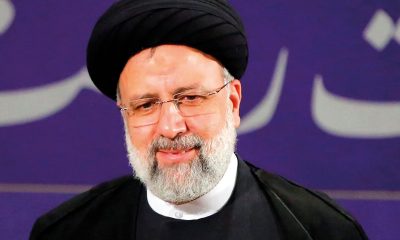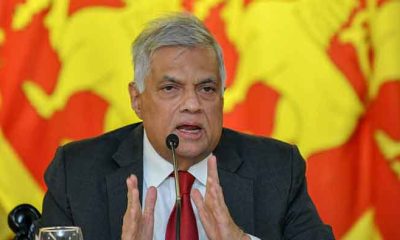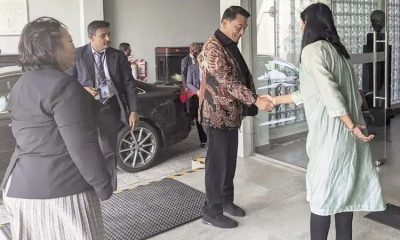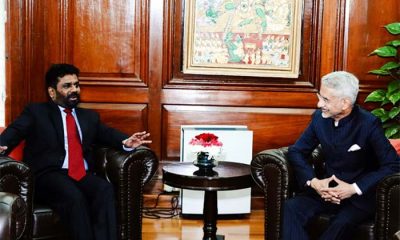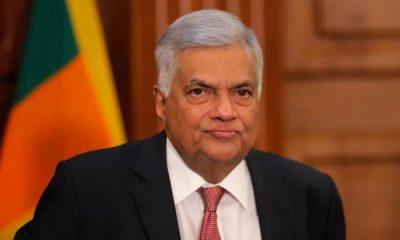Features
THE GREATEST COMEBACK STORY NEVER TOLD

PRESIDENT BIDEN – STATE OF THE UNION SPEECH, 2024
by Vijaya Chandrasoma
President Biden gave the final State of the Union speech of the first term of his presidency on Thursday, March 7, 2024. It was probably the most important speech in his long and distinguished career in public service, which spans over half a century. Biden represented Delaware in the Senate from 1973 to 2009, served as Vice-President in the administrations of President Barack Obama from 2009 to 2017, and the incumbent 46th President since January, 2021.
President Biden is certainly no stranger to one of the most hallowed annual rituals in America, the State of the Union Speech, a ceremonial occasion to illustrate U.S. democracy in action. He was completely at ease in an environment most familiar to him, and his fiery performance in this vital speech tended to lay to rest immediate misgivings about his advanced age and ability to run for a second term.
Conventional wisdom suggests that it would be more prudent to elect to the highest post in the land a man 81 years old, with over 50 years in public service at the highest levels behind him, rather than a 78-year-old ex-con, bankrupt sexual predator with 91 felonies ahead of him.
The State of the Union speech is not a constitutional requirement. The constitution requires the president to “periodically give to the Congress information of the State of the Union, and recommend to their Consideration such Measures as he shall judge necessary and expedient”. Although George Washington delivered the first State of the Union in person on January 8, 1790 in New York, Thomas Jefferson considered that such a speech, imitating the British monarch’s Speech from the Throne, was ill-suited to a republic. He favored the policy of submitting written reports of the State of the Union, which practice persisted until 1913, when President Woodrow Wilson resumed the delivery of such information to Congress in person.
Biden kicked off his fiery, starkly political speech attacking Trump, referring to him never by name, but only as “my predecessor”.
He compared this moment to Franklin Roosevelt’s speech State of the Union speech in January 1941, when “Hitler was on the march. War was raging in Europe. Freedom and democracy were under assault in the world”. Today, Russia’s Putin is on the march in Ukraine, threatening peace in Europe. And democracy is again under assault in the world.
Biden railed against Trump’s admitted intention to leave NATO, the greatest military alliance the world has ever seen, if re-elected. He condemned Trump’s encouragement for Putin to do “whatever the hell he wants” against Ukraine, which will endanger the security of US allies in Europe. Biden said, “If anybody in this room thinks that Putin will stop at Ukraine, I assure you he will not”.
“I say this to Congress, we must stand up to Putin. History is watching”.
Biden attacked “my predecessor”, a total of 13 times. He vilified Trump for his role in spreading election lies after November 2020, which led to the violent insurrection of January 6, 2021, the greatest threat to the democracy of the nation since the Civil War, saying, “my predecessor and some of you here seek to bury the truth of January 6. I will not do that”.
“Insurrectionists stormed this very Capitol, and placed a dagger at the throat of American democracy. Many of you were here on that darkest of days. But they failed. America stood strong and democracy prevailed. But the threat remains and we must defend it”.
He said that “my predecessor” succeeded in achieving what the Republican Party had been seeking for years, the overturning of Roe v. Wade, which had, since 1973, guaranteed women’s reproductive freedom. Roe v. Wade ruled that abortion was a decision to be made by the woman (with her parents in the case of a minor), her doctor and her God. Biden said, “If Americans send me a Congress that supports the right to choose, I promise you, I will restore Roe v. Wade as the law of the land again”.
Women’s reproductive freedom, coupled with immigration, will prove to be the two major issues in the upcoming presidential election.
Last month, Congress submitted a bipartisan immigration bill, authored by one of the most conservative of Republican Senators, James Lankford of Oklahoma, in co-operation with Democratic Senator Chris Murphy of New Jersey and Independent Senator Kyrsten Sinema of Arizona, endorsed by a majority of Republicans in Congress. This is a bill that would impose the toughest set of border security reforms ever seen, one that would save lives and bring order to the border; a bill that had the support of the Border Patrol Union.
Biden said, “It would also give me, as president, new emergency authority to temporarily shut down the border when the number of migrants at the border is overwhelming”.
The proposed bill was certain to pass the House and the Senate. Unfortunately, under the instructions of Donald Trump, Speaker Mike Johnson refused to bring the bill before the House. The reason: Trump felt it would be a political win for Biden, and a political loss for him, in November.
So the bill will be languishing till after November, eight months during which the chaos at the southern border will continue, and people will die, purely because Trump feels such a bill may cost him the election.
Biden set out his accomplishments during the three years of his presidency, and outlined his agenda for a second term. He described an economy that is, by all accounts, roaring back after the near-recession he inherited after the Covid years, as the “greatest comeback story never told”. This was a repudiation of unfair public perception and persistently negative media coverage of his handling of the economy; an economy that had received optimistic praise from the heads of the International Monetary Band and Federal Reserve Board, among others.
Biden focused heavily on populist themes, like raising taxes on corporations and the super-wealthy, lowering cost of prescription medication and expanding the Affordable Care Act (Obamacare), and imposing strict gun control laws, including the banning of assault rifles – issues that have the overwhelming support of all Americans, Democrats, Republicans and Independents.
Biden made no secret of his age, noting that, during his career, he has been told that he’s too young and too old. But despite his age, he has “always known what endures. I’ve always known our North Star. The very idea of America, that we are all created equally and deserve to be treated equally throughout our lives”.
In summary, Biden seized the pomp and circumstance of a nationally televised event, with the massive media spotlight it commands, to frame the November election clash with his predecessor, “as an existential struggle over America’s place in the world and the integrity of U.S. democracy itself”.
Biden ended his speech with these stirring words. “I see a future where we defend democracy, not diminish it. I see a future where we restore the right to choose and protect other freedoms, not take them away. I see a future where the middle class finally has a fair shot, and the wealthy finally have to pay their fair share in taxes. I see a future where we save the planet from the climate crisis and our country from gun violence. Above all, I see a future, a country for all Americans”.
A November rematch of Trump and Biden, bar the intervention of natural causes, seems inevitable. There are current rumors that Robert F. Kennedy Jr., the disgraced son of Robert F. Kennedy and nephew of JFK, will also announce his candidacy for the presidency as an Independent. He has absolutely no chance of winning the presidency, but he could well muddy the waters.
Biden’s State of the Union speech, vibrant and energetic as it was, was warmly greeted by an estimated 60% of the 30+ million who watched it on live TV. The surest signs of its success were the comments made by Republicans, notably Fox News, who had over the past few years been mocking Biden’s senility and lack of cognitive acuity. They have now started calling him “Jacked-up Joe”, alleging that he was under the influence of drugs when he delivered such an energetic performance. Donald Trump accused “Sleepy Joe” of making a completely out-of-character “dark, hate-filled, angry” speech, the ultimate compliment from the Prince of Transference.
From January, 2025, either Trump or Biden will be entrusted to take over the mantle of the leader for the free world, and act as the chief antagonist of the nation’s adversaries for a further four years. The leaders of these main adversarial nations, Presidents Putin of Russia and Xi of China are also no spring chickens, both 70 years of age, but mere lads compared to Biden and Trump.
The USA has always supported Israel’s right to self-defense, but Netanyahu’s disproportionate and continuing violence against the Palestinian civilians of Gaza, in revenge for Hamas’ brutal attacks of October 7, has already claimed over 30,000 innocent lives of men, women and children, and displaced millions. The Senate majority leader, Democrat Senator, Chuck Schumer last week condemned Israeli Prime Minister, Netanyahu for the denial of a ceasefire demanded by the world, including the USA. Netanyahu’s refusal to negotiate for a two-state solution indicates his ultimate goal of a one-state solution, with the elimination of Palestinians, one way or another.
Biden is taking appropriate actions in the increase to the provision of humanitarian aid for the beleaguered Palestinian civilian population in Gaza. He has imposed sanctions against Israel and threatens to withdraw military assistance to prosecute an unjust and cruel war. Probably too little, too late.
The more dangerous scenario is Trump’s public announcement that if he is defeated in November, he will, once again claim that the Democrats rigged the election against him. He is already planting the seeds of public suspicion in the integrity of the 2024 national electoral process.
Trump has now reconstituted the Republican Party to take complete control of the House, the Senate, and as of last week, the Republican National Committee (RNC). Chairperson, Ronna McDaniel has been fired and replaced by Trump’s daughter-in-law, Lara Trump. The RNC member, Beth Bloch, who announced Ms. Trump’s appointment as co-chair, made a virtue of her total lack of experience with a truly Christian explanation: “God does not call the qualified. He qualifies the called”.
Most significantly, Trump has appointed election denier Christina Bobb as Senior Counsel for Election Integrity. The only qualification to be a member of today’s Republican Party is unquestioning loyalty to Trump.
I am assuming that Trump will be soundly defeated in November. If Americans are even more nuts than my wildest nightmares and elect him, then America will come under the aegis of the world’s dictatorships and kleptocracies.
To put it bluntly, Russia will annex Ukraine and Israel will be an independent state, free of Palestinians, with no resistance from the Americans. An end of an era would be ushered when the geopolitical structure of the world would be dramatically transformed.
And even in the most likely event that the Democrats win both the presidency and Congress in a fair election, there is little doubt that Trump will, once again, call Foul and refuse to concede defeat. The nation will be plunged into political violence, tantamount to a civil war, for which Trump and the radical red cult are already making the necessary preparations.The November presidential election is beginning to look awfully like a Lose Lose situation for America.
Features
Rethinking post-disaster urban planning: Lessons from Peradeniya
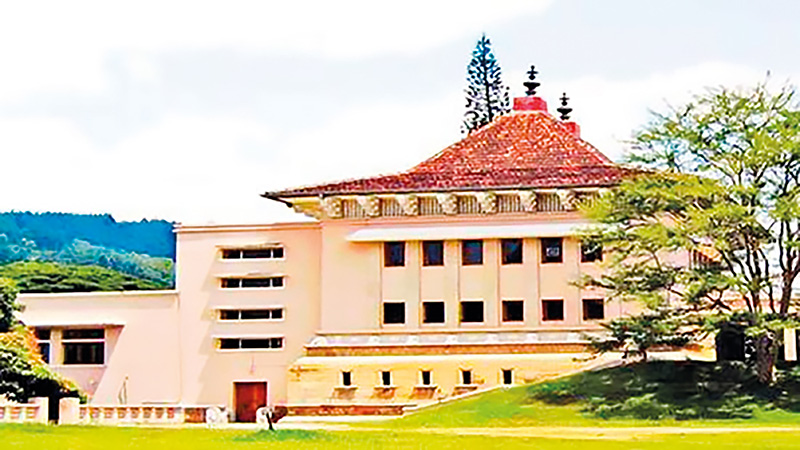
A recent discussion by former Environment Minister, Eng. Patali Champika Ranawaka on the Derana 360 programme has reignited an important national conversation on how Sri Lanka plans, builds and rebuilds in the face of recurring disasters.
His observations, delivered with characteristic clarity and logic, went beyond the immediate causes of recent calamities and focused sharply on long-term solutions—particularly the urgent need for smarter land use and vertical housing development.
Ranawaka’s proposal to introduce multistoried housing schemes in the Gannoruwa area, as a way of reducing pressure on environmentally sensitive and disaster-prone zones, resonated strongly with urban planners and environmentalists alike.
It also echoed ideas that have been quietly discussed within academic and conservation circles for years but rarely translated into policy.
One such voice is that of Professor Siril Wijesundara, Research Professor at the National Institute of Fundamental Studies (NIFS) and former Director General of the Royal Botanic Gardens, Peradeniya, who believes that disasters are often “less acts of nature and more outcomes of poor planning.”
“What we repeatedly see in Sri Lanka is not merely natural disasters, but planning failures,” Professor Wijesundara told The Island.
“Floods, landslides and environmental degradation are intensified because we continue to build horizontally, encroaching on wetlands, forest margins and river reservations, instead of thinking vertically and strategically.”
The former Director General notes that the University of Peradeniya itself offers a compelling case study of both the problem and the solution. The main campus, already densely built and ecologically sensitive, continues to absorb new faculties, hostels and administrative buildings, placing immense pressure on green spaces and drainage systems.
“The Peradeniya campus was designed with landscape harmony in mind,” he said. “But over time, ad-hoc construction has compromised that vision. If development continues in the same manner, the campus will lose not only its aesthetic value but also its ecological resilience.”
Professor Wijesundara supports the idea of reorganising the Rajawatte area—located away from the congested core of the university—as a future development zone. Rather than expanding inward and fragmenting remaining open spaces, he argues that Rajawatte can be planned as a well-designed extension, integrating academic, residential and service infrastructure in a controlled manner.
Crucially, he stresses that such reorganisation must go hand in hand with social responsibility, particularly towards minor staff currently living in the Rajawatte area.
“These workers are the backbone of the university. Any development plan must ensure their dignity and wellbeing,” he said. “Providing them with modern, safe and affordable multistoried housing—especially near the railway line close to the old USO premises—would be both humane and practical.”
According to Professor Wijesundara, housing complexes built near existing transport corridors would reduce daily commuting stress, minimise traffic within the campus, and free up valuable land for planned academic use.
More importantly, vertical housing would significantly reduce the university’s physical footprint.
Drawing parallels with Ranawaka’s Gannoruwa proposal, he emphasised that vertical development is no longer optional for Sri Lanka.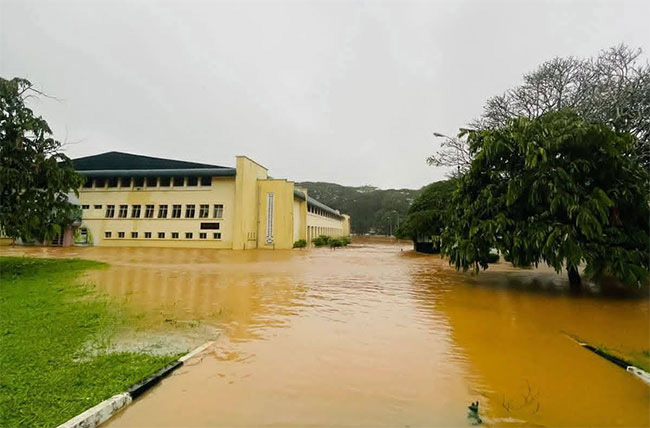
“We are a small island with a growing population and shrinking safe land,” he warned.
“If we continue to spread out instead of building up, disasters will become more frequent and more deadly. Vertical housing, when done properly, is environmentally sound, economically efficient and socially just.”
The veteran botanist also highlighted the often-ignored link between disaster vulnerability and the destruction of green buffers.
“Every time we clear a lowland, a wetland or a forest patch for construction, we remove nature’s shock absorbers,” he said.
“The Royal Botanic Gardens has survived floods for over a century precisely because surrounding landscapes once absorbed excess water. Urban planning must learn from such ecological wisdom.”
Professor Wijesundara believes that universities, as centres of knowledge, should lead by example.
“If an institution like Peradeniya cannot demonstrate sustainable planning, how can we expect cities to do so?” he asked. “This is an opportunity to show that development and conservation are not enemies, but partners.”
As climate-induced disasters intensify across the country, voices like his—and proposals such as those articulated by Patali Champika Ranawaka—underscore a simple but urgent truth: Sri Lanka’s future safety depends not only on disaster response, but on how and where we build today.
The challenge now lies with policymakers and planners to move beyond television studio discussions and academic warnings, and translate these ideas into concrete, people-centred action.
By Ifham Nizam ✍️
Features
Superstition – Major barrier to learning and social advancement

At the initial stage of my six-year involvement in uplifting society through skill-based initiatives, particularly by promoting handicraft work and teaching students to think creatively and independently, my efforts were partially jeopardized by deep-rooted superstition and resistance to rational learning.
Superstitions exerted a deeply adverse impact by encouraging unquestioned belief, fear, and blind conformity instead of reasoning and evidence-based understanding. In society, superstition often sustains harmful practices, social discrimination, exploitation by self-styled godmen, and resistance to scientific or social reforms, thereby weakening rational decision-making and slowing progress. When such beliefs penetrate the educational environment, students gradually lose the habit of asking “why” and “how,” accepting explanations based on fate, omens, or divine intervention rather than observation and logic.
Initially, learners became hesitant to challenge me despite my wrong interpretation of any law, less capable of evaluating information critically, and more vulnerable to misinformation and pseudoscience. As a result, genuine efforts towards social upliftment were obstructed, and the transformative power of education, which could empower individuals economically and intellectually, was weakened by fear-driven beliefs that stood in direct opposition to progress and rational thought. In many communities, illnesses are still attributed to evil spirits or curses rather than treated as medical conditions. I have witnessed educated people postponing important decisions, marriages, journeys, even hospital admissions, because an astrologer predicted an “inauspicious” time, showing how fear governs rational minds.
While teaching students science and mathematics, I have clearly observed how superstition acts as a hidden barrier to learning, critical thinking, and intellectual confidence. Many students come to the classroom already conditioned to believe that success or failure depends on luck, planetary positions, or divine favour rather than effort, practice, and understanding, which directly contradicts the scientific spirit. I have seen students hesitate to perform experiments or solve numerical problems on certain “inauspicious” days.
In mathematics, some students label themselves as “weak by birth”, which creates fear and anxiety even before attempting a problem, turning a subject of logic into a source of emotional stress. In science classes, explanations based on natural laws sometimes clash with supernatural beliefs, and students struggle to accept evidence because it challenges what they were taught at home or in society. This conflict confuses young minds and prevents them from fully trusting experimentation, data, and proof.
Worse still, superstition nurtures dependency; students wait for miracles instead of practising problem-solving, revision, and conceptual clarity. Over time, this mindset damages curiosity, reduces confidence, and limits innovation, making science and mathematics appear difficult, frightening, or irrelevant. Many science teachers themselves do not sufficiently emphasise the need to question or ignore such irrational beliefs and often remain limited to textbook facts and exam-oriented learning, leaving little space to challenge superstition directly. When teachers avoid discussing superstition, they unintentionally reinforce the idea that scientific reasoning and superstitious beliefs can coexist.
To overcome superstition and effectively impose critical thinking among students, I have inculcated the process to create a classroom culture where questioning was encouraged and fear of being “wrong” was removed. Students were taught how to think, not what to think, by consistently using the scientific method—observation, hypothesis, experimentation, evidence, and conclusion—in both science and mathematics lessons. I have deliberately challenged superstitious beliefs through simple demonstrations and hands-on experiments that allow students to see cause-and-effect relationships for themselves, helping them replace belief with proof.
Many so-called “tantrik shows” that appear supernatural can be clearly explained and exposed through basic scientific principles, making them powerful tools to fight superstition among students. For example, acts where a tantrik places a hand or tongue briefly in fire without injury rely on short contact time, moisture on the skin, or low heat transfer from alcohol-based flames rather than divine power.
“Miracles” like ash or oil repeatedly appearing from hands or idols involve concealment or simple physical and chemical tricks. When these tricks are demonstrated openly in classrooms or science programmes and followed by clear scientific explanations, students quickly realise how easily perception can be deceived and why evidence, experimentation, and critical questioning are far more reliable than blind belief.
Linking concepts to daily life, such as explaining probability to counter ideas of luck, or biology to explain illness instead of supernatural causes, makes rational explanations relatable and convincing.
Another unique example that I faced in my life is presented here. About 10 years ago, when I entered my new house but did not organise traditional rituals that many consider essential for peace and prosperity as my relatives believed that without them prosperity would be blocked. Later on, I could not utilise the entire space of my newly purchased house for earning money, largely because I chose not to perform certain rituals.
While this decision may have limited my financial gains to some extent, I do not consider it a failure in the true sense. I feel deeply satisfied that my son and daughter have received proper education and are now well settled in their employment, which, to me, is a far greater achievement than any ritual-driven expectation of wealth. My belief has always been that a house should not merely be a source of income or superstition-bound anxiety, but a space with social purpose.
Instead of rituals, I strongly feel that the unused portion of my house should be devoted to running tutorials for poor and underprivileged students, where knowledge, critical thinking, and self-reliance can be nurtured. This conviction gives me inner peace and reinforces my faith that education and service to society are more meaningful measures of success than material profit alone.
Though I have succeeded to some extent, this success has not been complete due to the persistent influence of superstition.
by Dr Debapriya Mukherjee
Former Senior Scientist
Central Pollution Control Board, India ✍️
Features
Race hate and the need to re-visit the ‘Clash of Civilizations’

 Australian Prime Minister Anthony Albanese has done very well to speak-up against and outlaw race hate in the immediate aftermath of the recent cold-blooded gunning down of several civilians on Australia’s Bondi Beach. The perpetrators of the violence are believed to be ardent practitioners of religious and race hate and it is commendable that the Australian authorities have lost no time in clearly and unambiguously stating their opposition to the dastardly crimes in question.
Australian Prime Minister Anthony Albanese has done very well to speak-up against and outlaw race hate in the immediate aftermath of the recent cold-blooded gunning down of several civilians on Australia’s Bondi Beach. The perpetrators of the violence are believed to be ardent practitioners of religious and race hate and it is commendable that the Australian authorities have lost no time in clearly and unambiguously stating their opposition to the dastardly crimes in question.
The Australian Prime Minister is on record as stating in this connection: ‘ New laws will target those who spread hate, division and radicalization. The Home Affairs Minister will also be given new powers to cancel or refuse visas for those who spread hate and a new taskforce will be set up to ensure the education system prevents, tackles and properly responds to antisemitism.’
It is this promptness and single-mindedness to defeat race hate and other forms of identity-based animosities that are expected of democratic governments in particular world wide. For example, is Sri Lanka’s NPP government willing to follow the Australian example? To put the record straight, no past governments of Sri Lanka initiated concrete measures to stamp out the evil of race hate as well but the present Sri Lankan government which has pledged to end ethnic animosities needs to think and act vastly differently. Democratic and progressive opinion in Sri Lanka is waiting expectantly for the NPP government’ s positive response; ideally based on the Australian precedent to end race hate.
Meanwhile, it is apt to remember that inasmuch as those forces of terrorism that target white communities world wide need to be put down their counterpart forces among extremist whites need to be defeated as well. There could be no double standards on this divisive question of quashing race and religious hate, among democratic governments.
The question is invariably bound up with the matter of expeditiously and swiftly advancing democratic development in divided societies. To the extent to which a body politic is genuinely democratized, to the same degree would identity based animosities be effectively managed and even resolved once and for all. To the extent to which a society is deprived of democratic governance, correctly understood, to the same extent would it experience unmanageable identity-bred violence.
This has been Sri Lanka’s situation and generally it could be stated that it is to the degree to which Sri Lankan citizens are genuinely constitutionally empowered that the issue of race hate in their midst would prove manageable. Accordingly, democratic development is the pressing need.
While the dramatic blood-letting on Bondi Beach ought to have driven home to observers and commentators of world politics that the international community is yet to make any concrete progress in the direction of laying the basis for an end to identity-based extremism, the event should also impress on all concerned quarters that continued failure to address the matters at hand could prove fatal. The fact of the matter is that identity-based extremism is very much alive and well and that it could strike devastatingly at a time and place of its choosing.
It is yet premature for the commentator to agree with US political scientist Samuel P. Huntingdon that a ‘Clash of Civilizations’ is upon the world but events such as the Bondi Beach terror and the continuing abduction of scores of school girls by IS-related outfits, for instance, in Northern Africa are concrete evidence of the continuing pervasive presence of identity-based extremism in the global South.
As a matter of great interest it needs mentioning that the crumbling of the Cold War in the West in the early nineties of the last century and the explosive emergence of identity-based violence world wide around that time essentially impelled Huntingdon to propound the hypothesis that the world was seeing the emergence of a ‘Clash of Civilizations’. Basically, the latter phrase implied that the Cold War was replaced by a West versus militant religious fundamentalism division or polarity world wide. Instead of the USSR and its satellites, the West, led by the US, had to now do battle with religion and race-based militant extremism, particularly ‘Islamic fundamentalist violence’ .
Things, of course, came to a head in this regard when the 9/11 calamity centred in New York occurred. The event seemed to be startling proof that the world was indeed faced with a ‘Clash of Civilizations’ that was not easily resolvable. It was a case of ‘Islamic militant fundamentalism’ facing the great bulwark, so to speak, of ‘ Western Civilization’ epitomized by the US and leaving it almost helpless.
However, it was too early to write off the US’ capability to respond, although it did not do so by the best means. Instead, it replied with military interventions, for example, in Iraq and Afghanistan, which moves have only earned for the religious fundamentalists more and more recruits.
Yet, it is too early to speak in terms of a ‘Clash of Civilizations’. Such a phenomenon could be spoken of if only the entirety of the Islamic world took up arms against the West. Clearly, this is not so because the majority of the adherents of Islam are peaceably inclined and want to coexist harmoniously with the rest of the world.
However, it is not too late for the US to stop religious fundamentalism in its tracks. It, for instance, could implement concrete measures to end the blood-letting in the Middle East. Of the first importance is to end the suffering of the Palestinians by keeping a tight leash on the Israeli Right and by making good its boast of rebuilding the Gaza swiftly.
Besides, the US needs to make it a priority aim to foster democratic development worldwide in collaboration with the rest of the West. Military expenditure and the arms race should be considered of secondary importance and the process of distributing development assistance in the South brought to the forefront of its global development agenda, if there is one.
If the fire-breathing religious demagogue’s influence is to be blunted worldwide, then, it is development, understood to mean equitable growth, that needs to be fostered and consolidated by the democratic world. In other words, the priority ought to be the empowerment of individuals and communities. Nothing short of the latter measures would help in ushering a more peaceful world.
-

 News4 days ago
News4 days agoMembers of Lankan Community in Washington D.C. donates to ‘Rebuilding Sri Lanka’ Flood Relief Fund
-

 News2 days ago
News2 days agoBritish MP calls on Foreign Secretary to expand sanction package against ‘Sri Lankan war criminals’
-

 Latest News7 days ago
Latest News7 days agoLandslide early warnings issued to the districts of Badulla, Kandy, Kurunegala, Matale and Nuwara-Eliya extended till 8AM on Sunday (21)
-

 Business6 days ago
Business6 days agoBrowns Investments sells luxury Maldivian resort for USD 57.5 mn.
-

 News5 days ago
News5 days agoAir quality deteriorating in Sri Lanka
-

 Features6 days ago
Features6 days agoHatton Plantations and WNPS PLANT Launch 24 km Riparian Forest Corridor
-

 News5 days ago
News5 days agoCardinal urges govt. not to weaken key socio-cultural institutions
-

 Features6 days ago
Features6 days agoAnother Christmas, Another Disaster, Another Recovery Mountain to Climb


